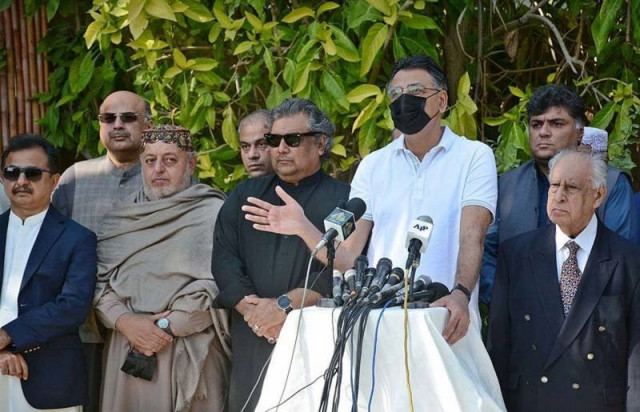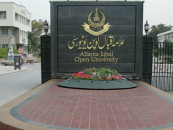Umar rules out military role in 7th digital census
Minister says ECP will be handed over final results by January next

Minister for Planning and Development Asad Umar on Tuesday announced that the government would not use military for headcount under the 7th Housing and Population Census, saying that it plans to hold the next general elections on the basis of the results of the new census.
“The role of the military will be limited to provision of security and it would not be involved in data collection,” Umar said while speaking to the media after the inauguration of the National Census Coordination Center (N3C) for Digital Census 2022. The centre has been set up to monitor real time census information.
Four years ago, a Technical and Audit Evaluation Committee of the 6th population census had objected to giving unrestricted access to the military to the census data after it found that “Pakistan Army used a special form (Form-786) to collect every kind of data”. “The questions included in Form-786 indicated that it appeared to be a parallel,” observed the committee.
Umar also laid out the schedule for the 7th population census that will begin from May 15 with pilot census of 1% or about 2,000 population blocks. The house listing will begin from August 1 followed by face-to-face interviews from August 4 to 31, 2022.
“The post-enumeration survey will be held in November 2022 and the Election Commission of Pakistan would be handed over the final results by January next year for delimitation of the constituencies,” the minister said. “Having a CNIC will not be mandatory for the population census.”
Umar said that the ECP would have sufficient time for delimitation for next elections, which he said would have to be conducted on the basis of new population census, as guided by the Constitution.
“Irrespective of how many deadlines the opposition parties give to oust the government, Prime Minister Imran Khan has a constitutional term till August 18, 2023 that he will complete,” the minister said. The previous government-constituted committee had found serious lapses in conducting the 6th population census by the Pakistan Bureau of Statistics (PBS).
READ Census policy fails to appease politicians in Karachi
The Technical and Audit Evaluation Committee also recommended fixing responsibility against the authorities concerned of the PBS for committing glaring lapses, an official report of the committee seen by The Express Tribune showed. But no action was taken at that time.
The Chief Statistician, Dr Naeemul Zafar, who is also the chief census commissioner, said that as per the UN Guidelines, the purpose of the population census was policy planning and there would be a counting of the whole population residing in the country at the time of the census irrespective of status.
The minister said, “The country needs quality data, which is crucial for planning and development. If any country wants good planning, it should have good informational data, and a census is the best exercise to collect it.”
To a question, Umar said that only 1 to 2 per cent of the census would be paper-based, and 98 per cent of the process digital. He said that the census results would be announced in December 2022.
The minister overruled the possibility of hacking or tampering of data during or after the census exercise due to foolproof measures being taken to stop such an attempt.
Umar said that the census budget estimates were not finalised yet but Rs10 billion would be used for the purchase of hardware, software, and tablets to conduct the digital census. An amount of Rs5 billion has been earmarked for the census expenditure in this budget.
While briefing about the census processes, the chief statistician said that this is the first time in the history of Pakistan that a digital census is being conducted. He said that consultation with provincial administrations and other relevant stakeholders was complete.
Zafar said that there would be 614 Census Support Centres across Pakistan, and one block would consist of 250 families, and the result of each block would be calculated separately. He said that 120,000 tablets would be procured for the census.
The government has added five more regional languages and one religion -Sikhism- in the 32 questions that an enumerator would ask during the door-to-door exercise. For the first time, the people had also been given a choice for self-enumeration that would begin from July 15 and continue for 15 days.



















COMMENTS
Comments are moderated and generally will be posted if they are on-topic and not abusive.
For more information, please see our Comments FAQ